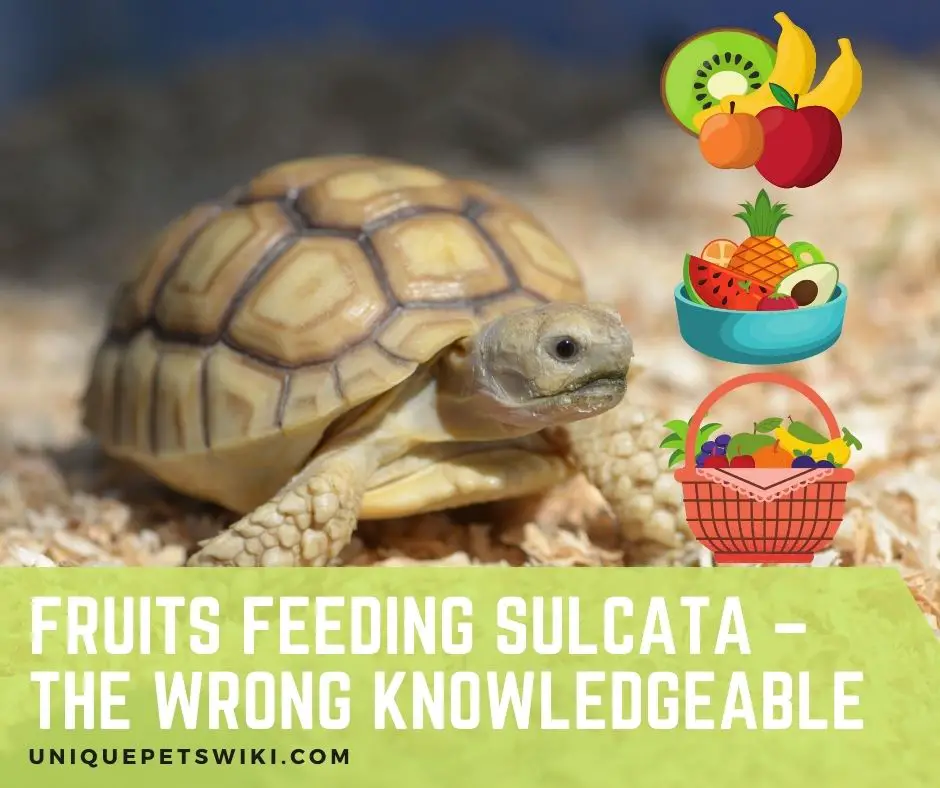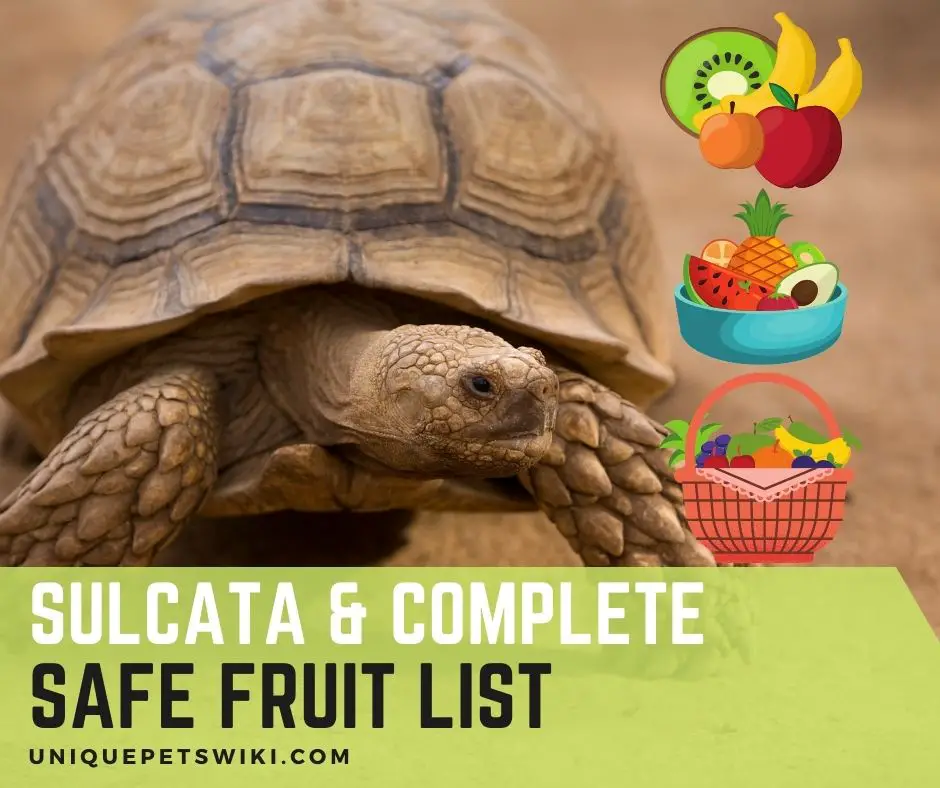Fruits are high in water, sugar, and vitamin contents. As such, they are not suitable for sulcata tortoises. In the wild, sulcata tortoises are not accustomed to fruits. However, you can feed your sulcata tortoises fruits as a treat sparingly.
Most sulcata tortoise keepers make feeding mistakes that sometimes cost the lives of their pets. Keep reading this article to avoid making such common and terrible mistakes.
This article will give you the complete Sulcata Tortoise Fruit List, help you understand what fruits, how much, and how frequently to feed your sulcata with fruits. Keep reading to stay knowledgeable.
This article has been reviewed by Dr. Dilber. Read more about our knowledge control process here.
Contents
Do Sulcata Tortoises Eat Fruits?
Sulcata tortoises do eat fruits. In fact, sulcata tortoises love fruits and can eat a lot of them if offered. It is, therefore, your responsibility as sulcata’s owner to limit what fruit, how much, and how often to feed them.
Some fruits are appropriate for sulcata tortoises to feed as a treat, while others are not. Some fruits are too high in water, sugar, and vitamins and are difficult to digest for sulcata tortoises.
The appropriate fruits to feed your sulcata tortoise should be low in phosphorus, fat, and protein. Fruits should have a proper calcium-phosphorus ratio of 1:1 or 2:1. The fruits should also be free from Persin. Persin is an antifungal compound that is mostly found in fruits such as avocados.
Consumption of fruits containing persins can cause organ failure and death in sulcata tortoises. Therefore, you should avoid fruits containing such chemicals at all costs.
Sulcata tortoises should only feed on fruits sparingly as a treat. Fruits have a high water content. That’s why they are good for treating constipation. However, too much fruits in the sulcata tortoise diet can cause diarrhea and disturb microbial flora in the digestive tract.
Therefore, you should feed your sulcata tortoise with fruits only once or twice a week. The fruits should only comprise 10% of your sulcata tortoise diet.

Here is a list of some of the appropriate fruits to feed your sulcata.
- Mangoes – feed sparingly. It contains too much sugar and can cause intestinal problems if taken regularly.
- Apples –feed sparingly. It contains sugars that can cause intestinal problems if consumed in large quantities.
- Watermelons – sparingly contain too much water and sugar.
- Berries – feed sparingly.
- Cactus – feed sparingly.
- Cherimoya – feed sparingly.
- Apricot – feed sparingly. Contains cyanogenic glycosides
- Banana – feed sparingly. It contains too much sugar and potassium.
- Bilberry – feed sparingly. It may contain diuretic properties.
- Blackberry– feed sparingly. It contains high levels of sugars.
- Blueberry – feed sparingly.
- Brussels sprouts – feed in moderation. It contains goitrogens that can affect iodine absorption if taken in large quantities.
- Chayote – feed sparingly. Chayote is not toxic and may contain anthelmintic properties suitable for eliminating worms. (no hard evidence about it)
- Cherry fruit– feed sparingly. It contains too much sugar that can affect the intestines if taken in large quantities.
- Cranberry – feed sparingly.
- Grape – feed sparingly. It contains high levels of sugar and can cause intestinal problems if taken in large quantities.
- Melon – feed sparingly. It contains too much sugar and water.
- Nectarine – feed sparingly. It contains too much sugar. You should not provide Nectarine stones as they contain cyanide.
- Peach – feed sparingly. It contains too much sugar. Peach stones contain cyanide, and thus you should avoid them.
- Pear – feed sparingly. It contains cyanide in its fruits.
- Pineapple – feed sparingly. Pineapples are very high in sugar.
- Plum– feed sparingly. They are very high in sugar. Don’t provide plum stones as they contain cyanide.
- Quince – feed sparingly. It’s very high in malic acid and thus might give a sour taste.
- Raspberry – feed sparingly. Very high in sugars and can cause intestinal problems.
- Squash – feed sparingly. They are not toxic and thus can be offered as a treat once a week.
Most people in sulcata tortoise communities agree that fruits should only be fed sparingly. Some say that the best time to offer fruit treats like melon is during summer to prevent dehydrating tortoises, especially during road trips.
Some do not know how much fruit is compared to green and vegetables to feed sulcata.
Some do not know what and how much fruit to feed their sulcata. You realize some sulcata tortoise keepers are quite ignorant of their pet’s diet through these community forums.
Fruits Feeding Sulcata – The Wrong Knowledgeable
Some sulcata tortoise owners won’t know that not all fruits are appropriate for their pets. For these reasons, they feed wrong or too much of the good fruits to their sulcata.

As a result, their sulcata experience health issues, and some even die from those unknowledgeable mistakes.
Some fruits should be avoided entirely, while you should offer others moderately or sparingly. As a sulcata pet owner, you must know which and how much fruit you should include in your sulcata’s diet.
Remember, some fruits contain too many toxins that they can kill your sulcata tortoise. To help you stay in the know and avoid such costly mistakes, we will give you a list of harmful fruits to offer sparingly or avoid altogether.
Lists of fruits that will harm your sulcata
- Avocado – never feed. It contains persin, which is harmful to tortoises.
- Black currant – feed sparingly. It contains small amounts of hydrogen cyanide.
- Oranges – never feed. It contains active ingredients that can harm tortoises.
- Lemon – never feed. It contains active ingredients that can harm tortoises.
- Pomegranate – never feed. It contains high levels of tannins. It can obstruct iron absorption if taken in large quantities.
- Red currant – never feed. It contains small amounts of hydrogen cyanide.
- Sweet pepper – never feed. Its calcium-to-phosphorus ratio is terrible and contains too many sugars.
- Tomatoes – Never feed, especially baby and older sulcata. Unripe tomatoes contain toxins, while ripens contain too many sugars.
Wrapping Up
Sulcata tortoises are natives of Sub-Saharan Africa. And, in the wild, the grass is their primary diet. In captivity, you should ensure to provide a similar diet to keep them healthy and happy.
However, sulcata tortoises love fruits. Thus, you can offer them fruits as a treat when you need to lure them into moving.
You should make these treats since fruits are very high in water and sugar. Too much sugar can cause intestinal and digestive problems, thus causing diarrhea.
Additionally, other fruits are too high in phosphorous and thus inhibit calcium absorption. Therefore, avoiding toxic fruits and limiting non-toxic fruits is imperative to keep your sulcata healthy.
